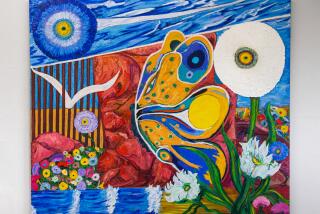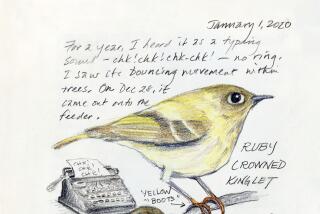All Too Human
- Share via
Eccentric genius bird artist John James Audubon seems to exert considerable attraction on the literary imagination. Years ago, Robert Penn Warren wrote a meditative book-length poem, “Audubon: A Vision” from his life and far-flung wanderings. Earlier this year novelist Maureen Howard used the man as a central figure in part of “Big as Life: Three Tales for Spring,” a suite of thematically resonant tales.
And now John Gregory Brown, much-praised author of “The Wrecked, Blessed Body of Shelton Lafleur” and “Decorations in a Ruined Cemetery,” gives us “Audubon’s Watch,” a compressed, highly charged novel that peels away the familiar legend portion of the biography to explore the private mysteries of memory, remorse and the redemption of pain.
Brown’s is, in this way, an intriguing strategy, for he deliberately makes only incidental use of what we imagine was the obsessive center of Audubon’s life: creating a complete artistic census of American bird life. Instead, he explores the ripples of consequence--moral, psychological--that widen over a lifetime from a single act of rash passion.
The narrative premise is quite simple. Audubon, very old and infirm, sends a letter to Emile Gautreaux, a man he had known many years before; he claims to have urgent matters to discuss. Gautreaux, a once-eminent physician disgraced for his advocacy of dissection, now himself in decline, travels by slow coach from New Orleans to New York City. As the days pass, each man broods over memories surrounding one particular night, long decades ago, when they kept vigil together over the body of Gautreaux’s beautiful young wife, Myra, who had died suddenly under mysterious circumstances.
What Gautreaux doesn’t know, and what torments Audubon that night--though not nearly to the degree that it will feast on his conscience in years to come--is that the artist had met Myra before. “Met” is far too mild. One night in New Orleans, the young woman had approached the artist and asked to have her portrait painted--unclothed. Try as he would to maintain his professional distance, he was unable. And Myra--who did not reveal that she was married--was responsive enough to his first advance to create deep moral and psychological tension.
When they meet again, at the estate of a mutual acquaintance, Myra is with her husband, Gautreaux. And very soon--with disconcerting abruptness--she is dead, seemingly of an alcohol overdose. The two men find themselves together with the body of a woman neither could be said to have understood. The burden of the unsaid belongs to the artist. How much this draws on known events in Audubon’s life is not made clear, but certainly the liberties Brown takes with rendering the man’s interior life are considerable.
The alternating chapters, in the voices of Gautreaux and of Audubon--the artist is, we gradually realize, telling his story to the spirits of his two deceased daughters--combined with our anticipation of the two men meeting and the sense that some deep question will be answered, creates a natural structural suspense. The revelations, payed out skillfully by the author, keep upping the moral ante.
But this description still does not get at the grave mysteriousness of the novel. Brown works against prevailing literary fashions; he is neither ironic nor oblique. He has a way of writing scenes emblematically, allowing encounters to carry a certain symbolic weight and making free with dramatic coincidence. At one point during their vigil, for instance, Audubon gives Gautreaux a pocket watch he’d bought years ago (hence the title) and which had long since stopped. He gives it as a symbol, but as soon as Gautreaux takes possession, the timepiece starts to work again. Sometimes--and why this should be is not always clear--the obvious can exert subtle effects.
Though elegantly and poetically written, the novel is quick with primal energies and powerfully troubling themes. We catch the heat of Audubon’s sexual passion for Myra, and we probe the ancient questions about betrayal, forgiveness and, centrally, the enigma of time and memory. As Gautreaux thinks, en route to his rendezvous: “It is by means of memory, I believed, that man is most human but as well possessed of an intimation of divinity, of that timeless state where past and present and future become joined, indistinguishable one from the other.” Brown’s novel, memory-driven, would keep us suspended in that state for the duration of our reading.
More to Read
Sign up for our Book Club newsletter
Get the latest news, events and more from the Los Angeles Times Book Club, and help us get L.A. reading and talking.
You may occasionally receive promotional content from the Los Angeles Times.







